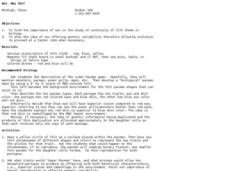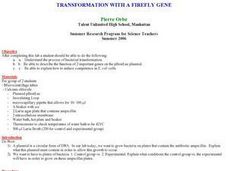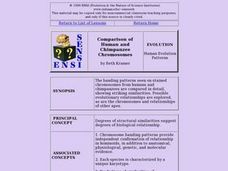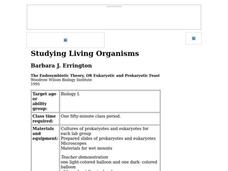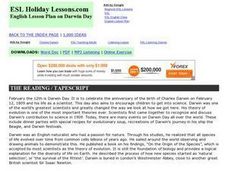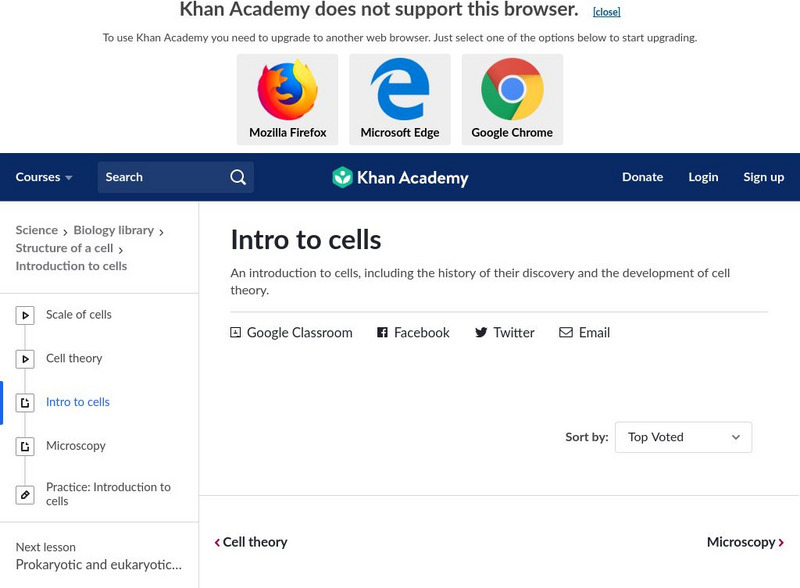Curated OER
Extraction of DNA from White Onion
Students conduct lab test with minced onion to determine where chromosonal DNA is located within the cell, and whether or not it can be extracted.
Curated OER
Evolution and Genes
For this psychology worksheet, students complete 5 short answer questions about traits, mutations and the theory of natural selection.
Cmassengale
Bacteria: Structure and Function
For as small as they are, there sure is a lot of information for young scientists to learn about bacteria. Help simplify the subject with this instructional presentation that explores the structure, nutrition, and reproduction of...
Core Knowledge Foundation
Genetics and the Master Race
How did the beginnings of genetic research influence the Nazi party? A thorough, engaging unit incorporates the work of Gregor Mendel, the study of inherited traits, and the use of racism and discrimination during the Holocaust.
Curated OER
Creative Ways To Teach Evolutionary Concepts
Young scholars explore evolutionary concepts in cartoons and lab activities. They describe and explain evolutionary concepts featured in a cartoon and participate in laboratory activities.
Curated OER
Origins Video Questions
In this biology activity, students complete 19 short answer questions about biodiversity and information obtained during a class video.
Curated OER
The Evolution of Living Things-Science Puzzlers, Twisters & Teasers
In this evolution learning exercise, students unscramble 9 vocabulary terms to solve a clue as well as complete 8 other riddles and word scrambles about evolution vocabulary.
Curated OER
But, Why Sex?
Students investigate the importance of sexual reproduction in evolution. In this sexual reproduction lesson plan, students simulate species with two traits: eye and skin color. They determine what characteristics are beneficial for the...
Curated OER
Transformation With A Firefly Gene
Students understand the process of bacterial transformation through experimentation. They describe the function of two important genes of the pBestLuc plasmid. They explain how to induce competence in E. coli cells.
Curated OER
Comparison of Human and Chimpanzee Chromosomes
Students actively engage in the careful analysis of chromosome banding patterns and identify examples of inversion in homologous chromosomes.
Curated OER
Hazard Mitigation: Bioterrorism
Students discuss different ways to spread infectious diseases. In this bioterrorism lesson, students model the rate of smoke emission using CalRoad software. They analyze the effects of airborne release of biological...
Curated OER
Feed Me, Seymour
Students work in small groups to create posters illustrating the major facts and functions of plant organs. Within their groups, they assume the role of specialists creating specialized posters pertaining to the different parts of plants.
Curated OER
Things Living in a Pond
Ninth graders observe, compare, and classify various microorganisms using a microscope. They answer discussion questions, and record their observations on a chart.
Curated OER
Protection, Support, and Locomotion
In this human body worksheet, students will review 5 terms associated with the skin by filling in the blank. Then students will read 14 statements about the human skeleton and muscles and determine if its true or false.
Curated OER
Virus Tracker
Sixth graders will simulate the spread of a virus such as HIV through a population by "sharing" (but not drinking) the water in a plastic cup with several classmates. Although invisible, the water in a few of the cups will already be...
Curated OER
The History of Life
In this history of life worksheet, students review 4 vocabulary words associated with the beginnings of life. Students place these terms into a crossword puzzle and then complete 2 fill in the blank questions.
Curated OER
Studying Living Organisms
High schoolers are introduced to Hardy-Weinberg Equilibrium without recourse to algebra. After participating in this activity, students gain a feeling for the significance of the Hardy-Weinberg Equilibrium without using algebra.
Curated OER
Where Do I Belong?
Tenth graders study the diversity of life in the world. They classify and sketch organisms into the 6 kingdoms.
Curated OER
Dogs & Darwin
Ninth graders construct and conduct a laboratory experiment illustrating the transfer of mutations. They compare and contrast natural selection in organisms with long and short reproductive cycles.
Curated OER
Darwin Day
In this Darwin Day learning exercise, students read or listen to a tape passage about Charles Darwin, then match phrases, fill in the blanks, choose words, unscramble words and sentences, put sentences in order, write discussion...
Curated OER
Studying Living Organisms
Students discover and discuss the differences between prokaryotes and eukaryotes. Using a microscope, they examine various prepared slides of prokaryotic and eukaryotic organisms.
BioMan Biology
Bio Man Biology: Cell Quizzes
Two multiple-choice quizzes about cells. The first is on cell theory, basic information about cells, and cell types. The second is on cell structures and functions.
CK-12 Foundation
Ck 12: Principles of Biology
[Free Registration/Login may be required to access all resource tools.] Explains the four principles that unify biology - cell theory, gene theory, homeostasis, and evolution.
Khan Academy
Khan Academy: Biology: Structure of a Cell: Introduction to Cells
Learn about cell theory in this article. [12:29]









